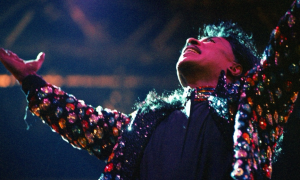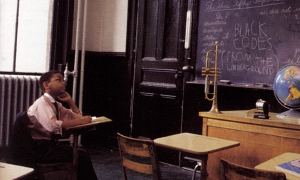Home » Jazz Articles » Opinion » Eric Mintel: The Way of Jazz
Eric Mintel: The Way of Jazz
If we are playing for a non-jazz audience who is hearing jazz for the first time, then it's up to us to open our mouths and talk to our audience and let them know what we're doing.
 For the past ten years I have led my quartet with many great performing opportunities. I've been playing the piano practically from the time I could crawl. My parents could always find me sitting at the piano and making up my own melodies. Composing came very early in life.
For the past ten years I have led my quartet with many great performing opportunities. I've been playing the piano practically from the time I could crawl. My parents could always find me sitting at the piano and making up my own melodies. Composing came very early in life.Now at age 36, I have a full time and very successful jazz quartet, a top 100 CD titled Hopscotch , a loyal following, performed at the White House and the Kennedy Center and continue performing and touring all over the United States and soon into Europe. But it wasn't an overnight success. I have built my quartet from the ground up, paid and continue to pay incredible dues but my passion for jazz overrides all the hard work it takes to play jazz professionally. It also helps to have band mates who are also friends, like Neil Wetzel on sax, Dave Antonow on bass and Jeremy Berberian on drums.
For years I have been interested in the one aspect of jazz that seems to connect with people all over the world but is seldom ever talked about. It's the main reason I play jazz and wanted to make jazz my full time occupation. And, I believe it's the main ingredient in jazz that will continue to reach people for generations to come.
I'm talking about the emotional concept of jazz. The ability to connect instantly, intellectually and emotionally through the music by the listener. This is what I strive for in my playing with different results night after night. The one constant result is my and my quartet's connection with the listener. This emotional concept in jazz is very interesting and exciting to me. Jazz is of course African-American in its origins, but if you go back over time you'll realize that many different cultures have embraced jazz and have had an instant connection with it without having a history with the music. It's with this idea that I have tried to experiment with in my own playing. Playing a tender musical phrase or something wild and unpredictable. It's the part about jazz that is so special.
Our audience, or any jazz group's audience, is hearing a personal part of each performer in the jazz setting. Why not give them something they can identify with. Blowing a million and one notes is great and will show off the technical achievements of the player, but if there's no emotional concept behind it, then it's just a million and one notes. Trying to play a preconceived formula in jazz to me is the wrong direction. Yes, we all have our own bag of tricks we use from time to time but it's that idea of abandoning these tricks and coming up with something musical and completely different night after night.
That emotional concept can be found within the heat of the performance, when certain elements come together during the improvisation. It can be during a slow song or a fast song, it doesn't matter. It's almost like going into a trance like state in which the mind automatically transmits the music throughout the body and through, in my case, my fingers to the piano keyboard, or any musician's particular instrument. Ideas are formed right on the spot.
Yes, this is the essence of improvisation, but it goes deeper than that. Spontaneous creativity. I've had this happen personally and I will have no idea where the ideas came from and I will have no recollection of what I've just played. I'm sure other jazz musicians know what I'm talking about. This is a unique event. It rarely happens and when it does the audience, if they're really listening, can feel it too. This idea of emotional content works individually or collectively and it doesn't have to be with a group that's been together for years. I've played with many different musicians and once in a while there is a musical and emotional "click" that happens within the first minute of a tune.
Once that click is found, to me, it's like we're reading each other's mind rhythmically and melodically. Again, and emotional level is then achieved where each individual is tuned in. As any jazz musician knows, jazz is like a conversation. Different topics are discussed, ideas are shared and the conversation moves on. We are also having a conversation with our audience whether they know it or not. We are not playing anything that comes to mind. We are using our years of practice and years of dedication and sacrifice to produce the music.
This is why it is so important to interact with our audience. Most of the time when we are in concert I will have very little idea of what I'm going to be playing. I do know that an audience wants to hear something they can follow or identify with. I'm not compromising my music, but I am giving my audience, who has come to hear me and my quartet, very special attention because the public is what will keep the jazz musician here today and tomorrow.
Getting back to the emotional concept, I have always been a melodic player because I strongly believe in melody and giving the listener something to follow. The music can be upbeat, sad, triumphant etc. Many different emotions can be related to jazz. In my own music I can identify with these emotions because of my great love and respect for jazz and this ability to connect with people through jazz music. To be able to touch upon an emotion, a tear, a feeling of happiness of melancholy within the listener, to me, is what jazz is all about. This is what we are all striving for as jazz musicians, isn't it?
The audience is such an integral part of our music making. If we're playing for a jazz audience than they will know how to react and how to feed the musicians with their appreciating of the music. If we are playing for a non-jazz audience that is hearing jazz for the first time, then it's up to us to open our mouths and talk to our audience and let them know what we're doing. It's amazing to me how many people, in a general public sense, still don't know what jazz is, how jazz is understood and what the jazz etiquette is all about. It's our job as performers to talk to our audience. We need to educate, not lecture, our audience about the inner workings of our music. This is the only way we as jazz musicians will come to the forefront of the public conscience.
Thankfully we have many great jazz institutions across the country cultivating jazz and it's development into the future. One of these great institutions is the Kennedy Center in Washington, DC. I've played there on several occasions, even as the only jazz group to perform for American and Japanese delegates where we had the officials and the audience of about 1,200 clapping to the jazz. There are also a lot of high school and college jazz programs available for students wanting to learn more about the music. I'm glad to be a part of this movement that is bringing quality entertainment to a public that wants to go to another level intellectually and emotionally.
I think a certain number of the public is getting sick of seeing who the next manufactured multi million dollar so called music personality will be through their television screens. The greatest thing about jazz is that the jazz musician is here today, tomorrow and the next day year after year, the other a fleeting memory in six months. Forgive me if that sounds bitter, that's not my intention, it's the truth. Jazz should be seen more on television and we should have awards shows for jazz and spotlight the musicians who are creating a positive difference in the lives of people around the world. And it should be seen in prime time. As a musician and as a creative human being, I'm still learning this process myself.
I don't know all the answers. I do know that jazz is a legitimate art form that should be shown to a much wider audience throughout this country. It's my own personal journey through jazz that makes this music not only my vocation, but my passion. I'm glad to be a part of the jazz community. I along with the other members of the quartet are on a mission to bring more jazz to the public, and when we're on that stage we educate, interact, add humor and give 100% to our audience who wants to hear something different, of high quality and emotional content.
< Previous
Fire and Ice
Comments
Tags
For the Love of Jazz
 All About Jazz has been a pillar of jazz since 1995, championing it as an art form and, more importantly, supporting the musicians who create it. Our enduring commitment has made "AAJ" one of the most culturally important websites of its kind, read by hundreds of thousands of fans, musicians and industry figures every month.
All About Jazz has been a pillar of jazz since 1995, championing it as an art form and, more importantly, supporting the musicians who create it. Our enduring commitment has made "AAJ" one of the most culturally important websites of its kind, read by hundreds of thousands of fans, musicians and industry figures every month.





















